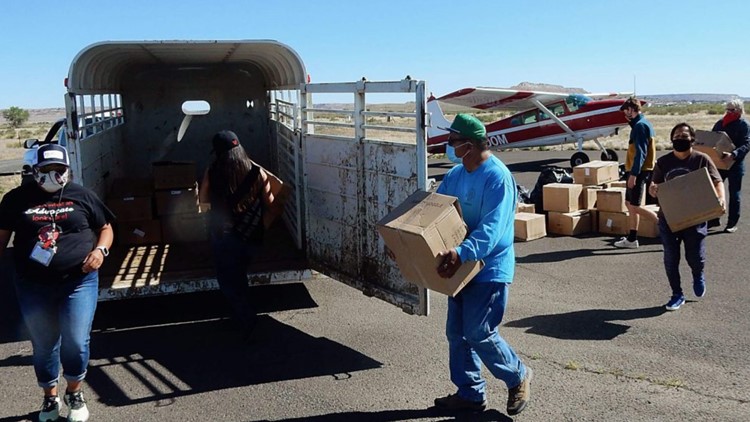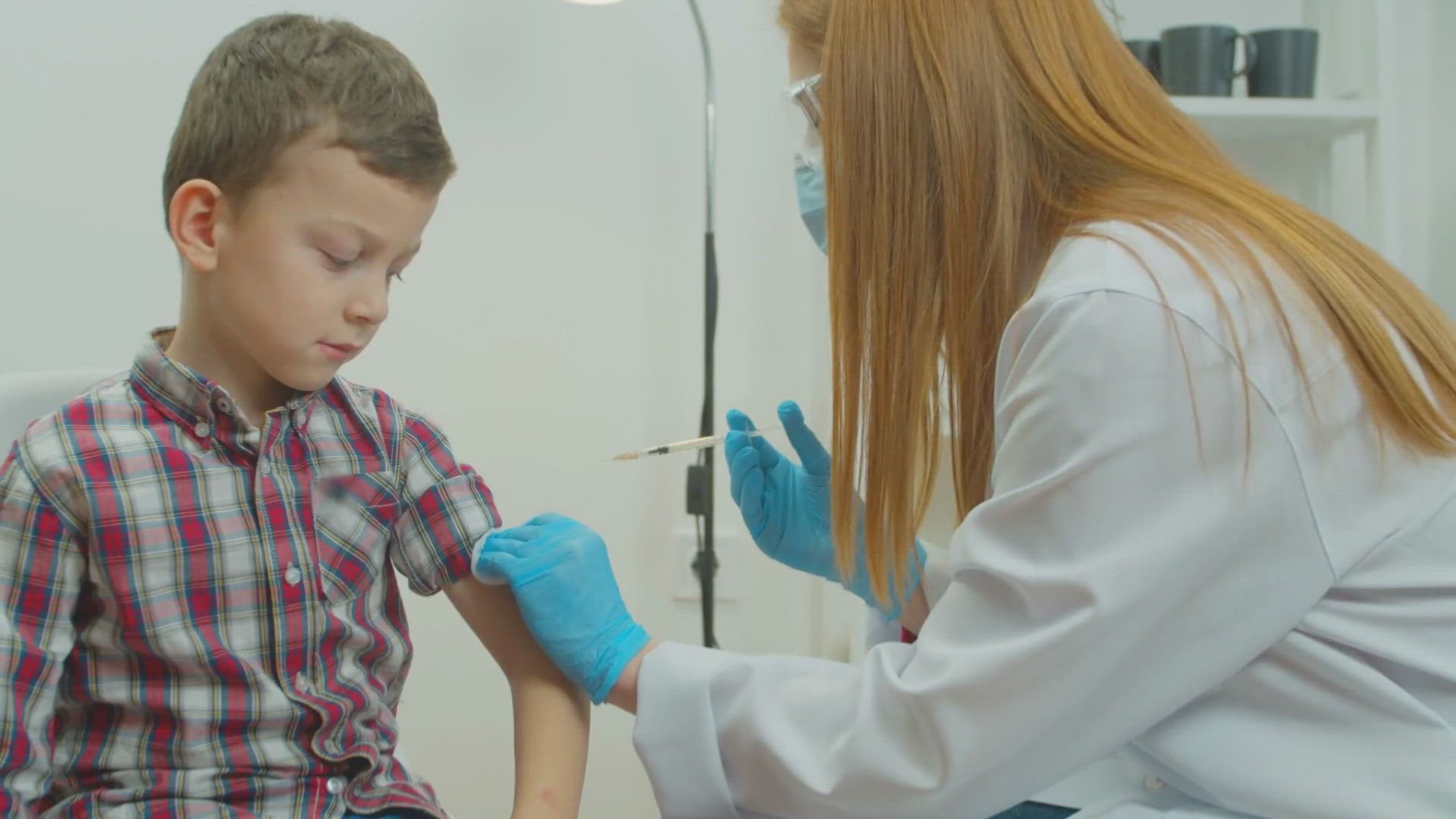ASPEN, Colo. — Ten small aircraft stuffed with N95 masks, face shields and hand sanitizer departed Aspen in bluebird skies June 10 and fanned out across the Four Corners region in what could prove to be a life-saving mission.
The volunteer pilots enlisted by Aspen-based conservation nonprofit EcoFlight delivered personal protective equipment to Native American tribes that have been hit hard by COVID-19. The reservations have some of the highest infection rates per capita in the United States.
“We live in such a privileged place here. We really haven’t seen the desperation,” said Bruce Gordon, a founder and executive director of EcoFlight as well as one of the pilots who flew Wednesday.
This story is powered by COLab, the Colorado News Collaborative. 9NEWS joined this historic collaboration with more than 40 other newsrooms across Colorado to better serve the public.
The tribes have faced bureaucratic delays with the federal government getting PPE delivered even though it’s vital, said Jane Pargiter, EcoFlight’s conservation director.
“A lot of the homes don’t have running water,” she said. That made the hand sanitizer particularly sought-after among the tribes.
The dire situation inspired Gordon and Pargiter to expand EcoFlight’s mission. The organization usually packs aircraft with scientists, conservationists, policy-makers and journalists to fly over public lands to educate them on pressing issues. This time, the planes were filled with gear to fight the coronavirus.
EcoFlight teamed with the Catena Foundation on this mission. Catena acquired the PPE and EcoFlight delivered it straight to the Native American people — skipping the slow supply lines of the feds. Gordon and Pargiter contacted connections they have developed via conservation projects over the years to establish the direct supply lines.
On Wednesday, four planes delivered PPE to Gallup, New Mexico, to representatives of the Navajo Nation In New Mexico, Arizona and Arizona, and the Zuni tribe; three planes flew to the Hopi Reservation in northeastern Arizona; and one plane each landed in Chinle and Kayenta, Arizona, and Cortez, Colorado. The Cortez drop assisted the Ute Mountain Ute tribe.
On Thursday, additional flights returned to the Hopi Reservation and at an airstrip to supply the Colorado River Indian Tribe.
All told, more than a quarter million masks, face shields and goggles were delivered along with several pounds of sanitizer purchased from Marble Distillery in Carbondale and donated by Woody Creek Distillery in Basalt.
Gordon said the supplies were shipped to Aspen from California. Atlantic Aviation allowed pallets to be stored in a corner of a hangar at the Aspen-Pitkin County Airport until it could be loaded into the individual planes.
“When we saw what we had in front of us, I reached out to the pilot community,” he said.
Several pilots who haven’t previously flown for EcoFlight volunteered their aircraft and time for the humanitarian mission. Those participating last week included Hawk Greenway, Gary Kraft, Mike Taets, Skip Behrhorst, Mike Waters, Peter Hutter, Walter Chi and Gary Kelly.
At the tiny village of Polocca, flanked by the First, Second and Third Mesas of the Hopi Reservation, three airplanes from Aspen were met by a masked greeting party headed by Clark Tenakhongva, vice chairman of the Hopi Tribe, and Samantha Honani, a representative of the Hopi Foundation.
They said the 12 villages and secluded residences scattered across the sprawling, 1.5-million acre reservation have seen a spike in the cases of the coronavirus in recent weeks.
“Because of that we’ve had villages that continue to execute the stay at home (order) to include curfew,” Honani said. “We have villages that are barricaded where you can’t enter if you don’t live there. Supplies and care packages are left at their staging area. They’re taking a very strong stance in protecting their villages and their community members.”
The Hopi Foundation is working with its people to stress the importance of wearing masks, washing hands with soap and water when available and with sanitizer when it’s not, and avoiding trips off the reservation whenever possible. The nearest Walmart and large grocery store are about an hour off the reservation, she noted. There is only one medical center located on the reservation.
“It’s imperative that we don’t underestimate that this can affect and impact any one of us, that this is a real issue,” Honani said.
Tenakhongva said places of employment on the reservation have been shut down since early March. Schools let out early. The stay-at-home order was extended to June 20.
“They’re taking it seriously now because family members are starting to get affected, testing positive, or they’ve lost a family member, so they know how serious it is,” he said.
Hopi, especially the elderly, are accustomed to staying at home, so that isn’t a huge adjustment, Tenakhongva said. But they also have strong family ties, so it is a sacrifice not being able to visit kids and grandchildren.
The virus has also affected the heart of Hopi lifestyle.
“A lot of the cultural part of our life has changed,” Tenakhongva said, “We have postponed a lot of our traditional ceremonies to at least next year. Usually what we do is from April all the way up to the end of July is the sacred Kachina dances. They’ve all been postponed until next year because we’re in close contact in the kivas, the ceremonial chambers much similar to a church. Lots of people are gathering there.
“Those are some of the things we’ve had to forego out of respect for the virus,” he said.
Tenakhongva pointed out Third Mesa off to the west of the small, grass-covered airstrip where the Aspen planes landed. The long, narrow mesa harbors the oldest continuously inhabited settlement in North America, dating back to around 1100. Their extended presence over the decades has taught the Hopi how to adapt to survive. About 12,000 people live on the reservation.
“As a tribe we’ve already been hit many times by other illnesses,” Tenakhongva said. “The last big one was the smallpox. It wiped out three-quarters of the tribe here.
“We’re aware of those things,” he continued. “We don’t want the same scenario to take place. It wasn’t a Hopi disease and this certainly isn’t a Hopi disease either. What they say is it formed somewhere and came on in some ways like a dust storm, blowing that virus over here.”
Shortly after exchanging greetings on Wednesday, the masked Aspen pilots unloaded their gear, creating mounds of sacks and bottles containing masks, face shields, sanitizer and empty bottles on the tarmac. Then it was loaded into pickup trucks and a horse trailer brought by the Hopi contingent. Everyone practiced social distancing, but it was plain to see that Tenakhongva wanted to thank the pilots in a more personal way and engage in more meaningful conversation, said pilot Mike Taets, a Basalt resident who donated use of his craft and his time for the trip.
His plane was so stuffed that 5-gallon buckets of sanitizer were riding in the passenger’s seat. He had N95 and surgical masks, goggles, the sanitizer and empty bottles. There wasn’t a weight issue but a bulk issue.
“I couldn’t get one more thing in my plane,” Taets said.
Tenakhongva said the PPE will be delivered to essential employees and other workers who are scheduled to return to work later this month.
Honani said the Hopi Foundation Emergency Response Team is in charge of distributing the PPE to the 12 villages on the reservation.
Once the PPE was loaded up, Tenakhongva thanked the pilots for their generosity.
“I’m very grateful that EcoFlight was able to provide these materials for us and it’s going to be put to good use,” he said. “I wish we would have met in better conditions, not in this kind of way, yet I’m so thankful you brought it in. I hope it will prevent people from being a casualty to this virus.”
The women in the Hopi contingent parted ways with the Aspen pilots by saying, “Askwali,” the female thank you while Tenakhongva said, “Kwa’kwah.”
scondon@aspentimes.com
SUGGESTED VIDEOS: COVID-19 Coronavirus



